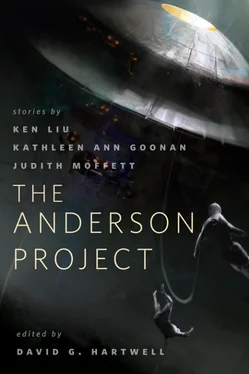“I’m afraid not,” Bob said firmly, pushing a grateful Josh out of the limelight. “Can’t be done in a sound bite, unfortunately. Read the article.” He smiled past her, into the camera lens. “Read the article, folks: centerfordreamresearch.upenn.edu. Look for ‘Space Ballet.’ The whole story’s in there.”
* * *
Note: a number of concepts, terms, and strategies in this story derive from Robert Moss’s many books about dreams and dreaming.
mossdreams.com

Copyright (C) 2014 by Judith Moffett
Art copyright (C) 2014 by Richard Anderson
Where Do We Come From?
What Are We?
Where Are We Going?
by Kathleen Ann Goonan
Leilani Kalani
¯¯¯¯¯¯¯¯¯¯¯
I hear her on the radio, while I’m in the bathroom drying my hair.
It’s about seven in the morning, and the forecast promises another dim, drizzly winter day. I’m an animal rights lawyer in Washington. I hate my job, I love my job, you get the picture. I’m happily married to Dan, a government employee, and we have a three-year-old daughter, Kara. He’s just left to drop her off at school.
The roar of hot air obscures every other radio word. When my mother speaks—“We demand legal recognition for all living creatures”—I drop my hair dryer. It clatters on the tile floor. I turn up the radio and listen, stunned.
My mother died twenty-five years ago.
Yet I hear my mother’s beloved voice: “…and humans practice deliberate cross-speciation, mingling plant and animal DNA for commercial gain. We therefore demand the right to accept or reject technological changes to our fundamental being.”
First come swift, crazy suppositions: she’s not really dead; this is a recording. Then it hits me, quite literally, in a flash, like slap upside the head. It’s Meitner, and she is an African Grey Parrot.
“From space, I see the Earth below me. I see the broad outlines of rain forests, where my kin flock; oceans where others of us school, and plains where herds run headlong…”
But it is like hearing the dead speak, and I am correspondingly chilled. When Mom died, Meitner vanished into the cloudy reaches of Kauai’s rain forest mountains, blended with her flock. I was just a little girl, as lonely as Meitner must have been, even though my father was close at hand. He was suffering too—withdrawn, grumpy. Unavailable, as they say.
Meitner could have consoled me. She did not.
The anger I’d had as a child resurfaces. I visualize smashing the mirror with the hair dryer, for an instant. The intensity of the impulse surprises me.
I feel betrayed. It had been easier to think that Meitner had died, though that too was as painful as any animal’s loss, the mystery of a vanishing. Funny to expect so much of a parrot, but Meitner is more than a parrot, and less than a parrot.
I sink to the cold tile floor, cross my legs, bow my head, and drink in my mother’s rich, low voice for a few more seconds before a male announcer interrupts the flowing words.
“Meitner, the African Grey Parrot you have just heard speaking, was a celebrity at one time. She disappeared after the death of her trainer, Dr. Jean Woodward, twenty-five years ago. As we piece together her story, we find that it is long and complicated. Presently, she is part of an experiment.
“Meitner is in a specially modified space suit, on a scientific mission in what has been dubbed the Stinger Ship. It looks like a massive jellyfish, complete with tentacles. But instead of stinging, these are life-support tentacles that allow people, and now, apparently, parrots, to float free in space. For those of you who have not been keeping up, this ship, which has been decades in the building, is scheduled to leave Earth’s orbit soon.
“We have gotten word that an entire flock of parrots will be dropped from the ship in specially made suits that allow parrots to operate jet packs, radios, and computers. All the parrots are enhanced in various ways, and their brain activities are being measured in real time. In fact, according to their spokesperson, the data being gathered is related to the mathematical abilities from which flocking behavior emerges. This information may lead to many breakthroughs, including—and it does sound far-fetched—space-time travel.”
Meitner’s words recede, and I recall my mother’s real voice telling bedtime stories, all of them merged in my memory into a single narrative of cloudy jungle, infused with the thrill of finding her African Grey Parrot and of the knowledge she hoped her studies might lead to. When I was a little girl, I imagined I had been with her on that trip. Like Meitner, I became part of her, so much so that her story is like a well-worn stone with strata exposed by the rush, the power, of time.
* * *
Mom was a postdoc when she tracked down Meitner.
She knew that animal activists had liberated Meitner and other animals from a Cairo lab, run by someone known internationally as Dr. Moreau. WikiLeaks had published some of Moreau’s research, in which it seemed clear that chimps, Grey Parrots, and porpoises injected with experimental neuroplasticity drugs were in captivity.
It was also clear that human DNA was part of their makeup.
The activists ran their standard operation, which, as usual, was in the news after the fact. They turned off the electricity, posted fake surveillance videos showing everything as normal, herded all the humans into a bus, evacuated every animal to an appropriate environment, and incinerated all records. A few bits left behind on the Internet are all anyone ever knew about the experiments. It was discovered that the lab had been established by a wealthy man, who died five years before the dramatic rescue. The original project was framed as an exploration of the possibilities and limits of rapid transpeciism with an eye to expanding human capabilities and lifespan. After the founder died, the project segued into a drug-development mill. Elephant poachers, charged with procuring a calf, tipped off authorities anonymously when they felt underpaid. No one knew what had happened to the animals, but once my mother heard about the parrot, she began sleuthing, getting closer to the secret heart of the activist organization, until she made the connection that changed our lives.
“After a year of feints and parries,” my mother would begin, at that magical hour on our Kauai ridgetop when I was tucked into bed and the smell of wild ginger filled the room, “I was in a small plane that landed with a big bounce on a short runway that looked like a river from the air because of the rain. When I climbed down from the plane, the wind whipped up my poncho and I was soaked in the first minute.”
Meitner was always in the bedroom, perched behind my mother on the old rocking chair from the Big Island that Tutu, my grandmother, gave us, eyes closed, listening and waiting, soothed as if on a bough moved by wind.
Mom’s calm, measured words and soothing voice were always tinged with humor, as if she might laugh at any moment at her younger self, so intrepid and, perhaps, lacking good judgment. “I could hardly see because of the rain, but a short, dark woman yelled ‘Bienvenu!’ out the window of a beat-up Land Rover almost hidden by the brush, under a huge baobab tree. When I got to the car, she flung open the passenger door and said, ‘Hurry inside, hurry inside!’ She had a round face and a big smile. She said, ‘Call me Belinda.’ It wasn’t her real name; that was part of the plan. I thrust my pack inside and slid into the seat. She shifted into first gear and rocketed down a mud-dirt road. I had no idea how she could see. The wipers didn’t work at all. I held onto the sissy bar for dear life.”
Читать дальше













